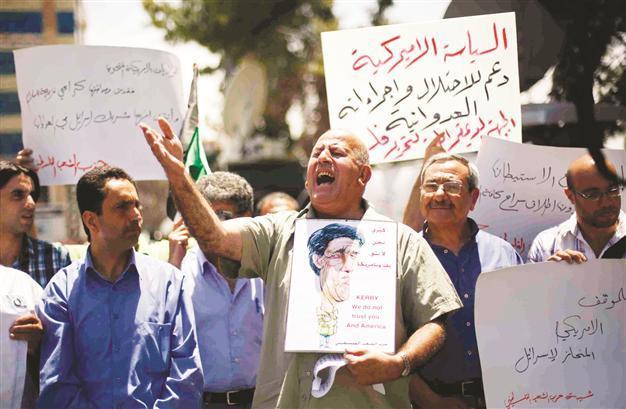Middle East peace push hits impasse
JERUSALEM / RAMALLAH

A Palestinian protester holds a caricature of US Secretary of State John Kerry at a demonstration in Ramallah. AFP photo
U.S. Secretary of State John Kerry’s renewed push for Middle East peace hit a snag as both sides, Palestine and Israel, are blaming each other for being reluctant to come to the table.
A senior Israeli official criticized the Palestinians yesterday, saying they were unwilling to talk peace despite a push by the United States and Israel to restart long-stalled negotiations.
Instead, Palestinians are opting to pursue a strategy of international recognition alone, said Deputy Foreign Minister Zeev Elkin. He made the remarks ahead of another attempt by John Kerry to revive peace talks when he returns to the region next week. “Israel is ready and willing to resume direct peace talks at any moment, it can be done today, tomorrow, in Jerusalem, in Ramallah, in Rome, anywhere in the world,” Elkin told Israel Radio.
“The world is waiting now for Abu Mazen,” he added, referring to Palestinian President Mahmoud Abbas. “Abu Mazen hopes to continue the unilateral track as long as he thinks the international community supports it ... he has no reason to resume negotiations,” Elkin also said. “Today the world understands more and more that this is where the problem is and is adopting our formula of peace talks without preconditions.”
Warning for both sidesKerry has not set a formal deadline for reaching a framework for peace talks, but he has signaled that he will float a formal proposal in the coming weeks. In a speech to American Jewish leaders in Washington on June 3, Kerry warned that time was running thin.
Talks collapsed nearly five years ago over the issue of construction in Israeli settlements built in captured areas Palestinians claim for a future state. Palestinians have said they will not talk until construction in settlements is stopped. Kerry has urged both sides to avoid provocative measures, telling Israel to curtail settlement construction and the Palestinians to put their campaign for international recognition on hold. Israel has said settlements, along with all the other issues such as borders and security, should be resolved in negotiations without preconditions. The Palestinians claim the West Bank, east Jerusalem and the Gaza Strip for their future state. Israel captured the areas in the 1967 Mideast war Israel withdrew from Gaza in 2005.
Elkin’s remarks came after chief Palestinian negotiator Saeb Erekat’s remarks in which he said the government is ready to resume its campaign to join the U.N. and other international bodies in order to prosecute Israel. Speaking to diplomats on June 4, Erekat blamed the Israelis for the lack of progress, citing Israel’s refusal to accept the 1967 lines as the basis for talks. The Palestinians have said the final border could be slightly modified through negotiated land swaps in order for Israel to keep some of its settlements. Two such proposals by previous Israeli governments failed to result in a peace accord.
